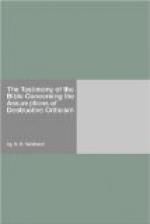Ezra, Nehemiah, and the prophets down to Malachi reiterated the same belief, sung and taught it to their children. Were they mistaken?
The finding of the Pentateuch during Josiah’s reign, which had been lost in the rubbish of the temple during the wicked reign of Manasseh and Ammon, is evidently referred to in 2 Chron. xxxiv. 14, 15; “Hilkiah the priest found the book of the law of Jehovah by the hand of Moses. (Margin, R.V.) And Hilkiah answered and said to Shaphan, I have found The Book of the law of the house of the Lord.” Four times within seven verses it is called “The Book.” It was read before the King, who humbled himself, and prepared himself and the people to observe the Passover as it had been prescribed in “the law of Moses.” Josiah commanded them to “kill the Passover, and sanctify yourselves and prepare your brethren, that they may do according to the word of the Lord by the hand of Moses” (2 Chron. xxxv. 6). This took place long before the exile, which the critics insist was the beginning of Israel’s literature, and after which they say the Pentateuch was written.
Ezra testifies to the existence of the Mosaic law before his time. His testimony establishes the Mosaic authorship of the Pentateuch. Ezra vii. 6: “This Ezra ... was a ready scribe in the law of Moses.”
After the return from captivity Ezra describes the building of the altar in these definite terms: “Then stood up Joshua, the son of Jozadak, and his brethren the priests, and Zerubbabel the son of Shealtiel, and his brethren, and builded the altar of the God of Israel, to offer burnt offerings thereon, as it is written in the law of Moses, the man of God” (Ezra iii. 2). Was Ezra deceiving the people?
There are several things to be noted here:
1. There was a written law of Moses, the man of God, then in existence. It was not a written law of Ezra which the priests palmed off as the written law of Moses.
2. There was a priestly order, according to the written law of Moses the man of God, not according to the invention of the exiles returning from captivity, under the pretense that Moses wrote it.
3. The altar was built according to the written law of Moses the man of God. These records by Ezra effectually bar the door against the critical conjecture that the Pentateuch, in which the written law of Moses the man of God is found, was fabricated after the exile.
The definite law for the place of building the altar, by which the priests proceeded in the days of Ezra, is recorded by “Moses the man of God,” in Deut. xii. 5-7: “Unto the place which the Lord your God shall choose out of all your tribes to put his name there, even unto his habitation shall ye seek, and thither shalt thou come; and thither shall ye bring your burnt offerings, and your sacrifices and your tithes and heave offerings of your hand, and your vows, and your freewill offerings, and the firstlings of your herds, and your flocks; and there ye shall eat before the Lord your God, and ye shall rejoice in all that ye put your hand unto, ye and your households, wherein the Lord thy God hath blessed thee.”




